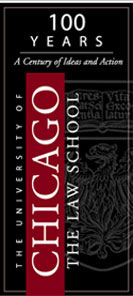|
First I must scoff at the tales some tell about law Schools being
anti-feminist at that early time. My experience was quite the
contrary, and I do not regard myself as a pioneer even though
there were less than 5 women in our class of about 150. My initial
contact with our Law School was when Dean Harry Bigelow helped
me to regain my working half tuition scholarship I initially rejected.
My assigned job was translating for Prof. Max Rheinstein pertinent
French labor law articles for the book he was writing. It couldn’t
have been a better job. Since I had been a French major in my
undergraduate work at the university of Illinois in Urbana, and
professor Rheinstein was a patient teacher. The following year
when I had him for Wills we all learned what an employer, “if
we were lucky enough to graduate, pass the Bar and get a job”
– would expect of a law clerk in terms of research, writing,
and being on time “regardless of the weather.” From
him I learned to prepare legal memoranda, which I later utilized
fully as Law Clerk for the Illinois Supreme Court, a job I held
for about 20 years.
My most challenging class that first year and perhaps throughout
our Law School, was in Professor Edward Levi’s course, “Elements
and Materials of the Law.” His wit was sharp, but so was
his mind. He had no favorites among the large class. Nor did he
demean any of the students, men or women, for not thinking as
fast as he did. He directed our attention to the history of the
law, to its philosophy, to the great scholars, to applying philosophical
concepts to practical legal problems. I shall never forget the
all night sessions of writing and rewriting the multitude of papers
he requested. And he read each paper-even wrote remarks on them.
I kept the major project I wrote on the history of Minimum Wage
Laws—analyzed in terms of all the facets of the law that
we had studied. I later used that “paper” as research
when I wrote the memoranda on the validity of the Illinois law
for our Supreme Court.
Winning the Moot Court competition in which our entire class
had to compete was a highlight, and I enjoyed writing for the
Law Review. As a Note writer I spent hours of original research
downtown interviewing the lawyers adjudicating a new administrative
law, to ascertain the problems involved. However, the Assistant
Editor assigned to my Note failed to take cognizance of that aspect,
and told me, on completion of the Note, that the subject had been
covered by another Review. Time waster? No, for I never became
that kind of an Assistant Editor myself in my senior year.
The most brilliant highlight was graduating from the majestic
Rockefeller Chapel knowing that I was ready to take the Bar, and
hopefully make a difference eventually in the quality of justice—or
at least help level the playing field of the Law. I hope I did;
as Law Clerk for the Supreme Court of Illinois for over 20 years;
as elected Trustee on the Village Board of Wilmette for 8 years;
President of the Women’s Bar Association in 1956; and a
Professor Law teaching Administrative Law and Torts at The John
Marshall Law School in the early ‘70’s; and by rearing
two sons, one an honored Professor of English Literature, and
one a “respected Washington Attorney,” in the words
of the New York Times.
|



